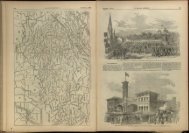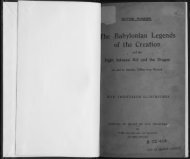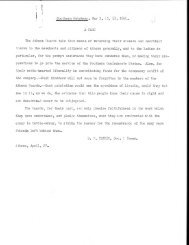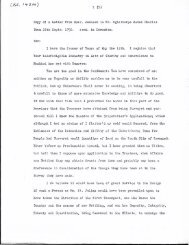THE SHE KING; OR, THE BOOK OF ANCIENT POETRY
THE SHE KING; OR, THE BOOK OF ANCIENT POETRY
THE SHE KING; OR, THE BOOK OF ANCIENT POETRY
Create successful ePaper yourself
Turn your PDF publications into a flip-book with our unique Google optimized e-Paper software.
322 <strong>THE</strong> <strong>BOOK</strong> <strong>OF</strong> <strong>POETRY</strong>. [PART III,<br />
Why call such men your offices to hold ?<br />
O'er your affairs why such men set ?<br />
' Heaven made them thus, so insolent and bold !'<br />
But 'tis from you their strength they get."<br />
3 Thus to the tyrant Show our king Wan said:—<br />
" Alas ! alas ! Yin's king so great,<br />
You honour not the good, but in their stead<br />
Oppressors whom the people hate.<br />
To you with baseless stories they reply,<br />
And thieves and robbers by them stand.<br />
Their oaths and maledictions fiercely fly,<br />
Ceaseless and deep, throughout the land."<br />
4 Thus to the tyrant Show our king Wan said :—<br />
" Alas ! alas ! 0 king of Yin,<br />
Fierce is your will, here in the court displayed,<br />
And only hatred thus you win.<br />
Your proper virtue you have never sought,<br />
And thus none good surround your throne.<br />
Of what true virtue is you take no thought,<br />
Hence are your nobles worthless known."<br />
5 Thus to the tyrant Show our king Wan said :—<br />
" Alas ! alas ! Yin's king so great,<br />
Not Heaven, but spirits, flush your face with red,<br />
That evil thus you imitate.<br />
You do in all your conduct what is wrong.<br />
Darkness to you the same as light,<br />
Your noisy feasts and revels you prolong;<br />
And day through you is black as night."<br />
G Thus to the tyrant Show our king Wan said :—<br />
" Alas ! alas ! 0 king of Yin,<br />
Round you it is as if cicadas made,<br />
And bubbling soup, their ceaseless din.<br />
Things, great and small, fast to perdition go,<br />
While you pursue your reckless game.<br />
Our Middle States with indignation glow; '<br />
The Demon lands as loudly blame."<br />
7 Thus to the tyrant Show our king Wan said :—<br />
" Alas ! alas ! O Yin's great king,<br />
III. II.] <strong>THE</strong> <strong>BOOK</strong> OP <strong>POETRY</strong>. 323<br />
'Tis Yin, not God, has caused this time of dread,<br />
Yin that old ways away would fling.<br />
Old men and wise may not give you their trust,<br />
But statutes and old laws remain.<br />
Now is Yin's fortune crumbling to the dust,<br />
Because obedience you disdain."<br />
8 Thus to the tyrant Show king Wan did speak : —<br />
" Alas ! alas ! O king of Yin,<br />
For Yin its beacon was not far to seek ; —<br />
In Hea's last king its light was seen.<br />
True is the lesson in the saying taught ; —<br />
'While leaf and branch still vigorous grow,<br />
A tree may fall. And what that fall has wrought ?<br />
Its roots uptorn the cause will show.' "<br />
II.<br />
The Yih ; narrative, excepting st. 9, which is allusive, CONTAINING<br />
VAEIOUS COUNSELS WHICH DUKE WOO <strong>OF</strong> WEI MADE TO ADMONISH<br />
HIMSELF, WHEN HE WAS OVEE HIS NINETIETH YEAE ;—ESPECIALLY<br />
ON <strong>THE</strong> DUTY <strong>OF</strong> A EULEE TO RE CAREFUL <strong>OF</strong> HIS OUTWABD DE<br />
MEANOUR, AND TO RECEIVE WITH DOCILITY INSTEUCTIONS DELIVEEED<br />
TO HIM.<br />
Ode VI. in the 7th Book of last Part is also attributed, we saw, to the<br />
same duke Woo, and there is a remarkable similarity in the structure<br />
of the two pieces and in many of the phrases. Especially do there ap<br />
pear in both the duty of attending to the outward deportment, and the<br />
way in which that is liable to be disordered by drunkenness. The<br />
authority for attributing the composition of the piece to duke Woo is the<br />
statement of the Preface, and an article in the " Narratives of the States,"<br />
—a Work often ascribed to the author of the Tso-chuen. This article<br />
relates how Woo, at the age of 95, insisted on his miuisters and officers<br />
being instant, in season and out of season, to admonish him on his con<br />
duct ; and concludes by saying that " he made the warnings of the E to<br />
admonish himself." The E is taken, correctly, I believe, to be only<br />
another name for the Till.<br />
Thus the speaker throughout the piece is Woo, and the "young son,"<br />
whom he sometimes addresses, is himself also. The conception of the<br />
writer in taking such a method to admonish himself is almost unique ;<br />
and the execution of it is successful.<br />
1 Outward demeanour, cool and grave,<br />
Reveals who inward virtue have.<br />
People in common parlance say,<br />
" Wise men stupidity display."<br />
21 *








